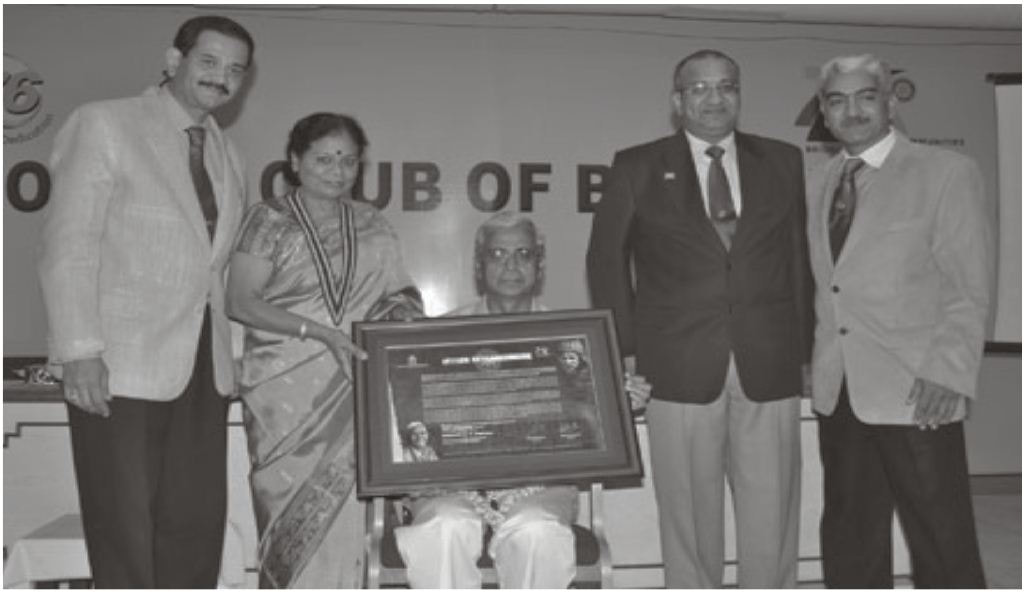|
Born on 30 December 1950, Sudarshan lived and studied in Yemlur near Bangalore in a Kannada medium school. He was a normal bright child till the age of 12, when the trauma of his father’s death changed his life forever. They were visiting a village on Vijayadashimi day. His father suddenly had a heart attack. Young Sudarshan ran to get the local quack that was the closest thing to a doctor the village had. Despite all this, his father passed away, as he says `literally on my lap’. That day he decided to become a doctor. His reading of Swamy Vikekananda, Mahatma Gandhi and Albert Schweitzer also left a deep impression on his mind, and the service ethic they embodied was ingrained into him. He passed his pre-university with good marks, but could not gain admission to a medical college as he was below 16. He spent a year working in a flourmill and joined Bangalore Medical College the next year. He also started visiting Ramakrishna Mission where he met H N Somasundaram. While studying medicine, he regularly met Dr Narasimhan who was working with Paniyas and Thodas in Ooty.
Deeply influenced by the life of Swamy Vivekananda, he took dheeksha from Swami Vireshwaranandaji Maharaj, the then President of Ramakrishna Mission. He worked in various places with the Ramakrishna Mission including Mayavathi in the Himalayas, Belur math in West Bengal, Ponnampet in Kodugu district of Karnataka. After 5 years, with the blessing of guru, he decided to work in B.R.Hills. The Ramakrishna Mission continued to support him in the mission. Dr. H Sudarshan, a young idealist doctor, came to BR Hills to work with the Soliga tribe. All he had was his education, his vision and his passion to make a difference. His early years at B.R.Hills were filled with insurmountable challenges and small success. Quick to anger quick to forgive he led by example , He maintained accounts, made tea, performed surgeries, built house, and even chased elephants ! When building had to be constructed, he learnt the art of construction. When stones had to be lifted into place, he was there to lift them. He made tea at 5.30 am each morning to motivate others to wake up early-just to drink it hot! On cold morning, hot tea was a strong incentive. An incentive was certainly needed as the staff of 17 was paid with Rs 1.800! They would work 15-18 hours a day on a salary of just Rs 50 or 100. The mission mattered the most. Also, when the boss took he took no money; it was difficult indeed to ask for a raise! Colleagues who travelled with Dr Sudarahan had to lend him money regularly, as he would forget to carry money. In 1981, Dr. Sudarshan set up Vivekananda Girijana Kalyana Kendra (VGKK), a voluntary non-government organization with a mission to protect the rights of the Soliga people, and provide them with a better quality of life. When VGKK started its work it focused mainly on providing health services to the Soligas. Over time, members realized that health in isolation would achieve little and extended their work to other areas of development. Various inchoate and incidental projects developed into a structured program aimed at the amelioration of the Soligas. Karuna Trust is an organization involved with integrated rural development and is affiliated to VGKK. The prevalence of leprosy in Yelandur Taluk of Chamarajanagar district was the motivation to start this trust. Another focus area for this trust is education and livelihood improvement. Karuna Trust runs 25 Primary Health Care (PHC) Centres in all the districts of the state of Karnataka and 9 PHC's in Arunachal Pradesh with the assistence of respective state governments. Dr. Sudarshan has held many positions in his career, prominent among which are the chairmanship of the Task Force on Health and Family Welfare set up by the Government of Karnataka, the Task Force on Public Private Partnership set up by the National Rural Health Mission (NRHM) of Government of India and Institute of Health management & Research (IHMR), Bangalore. He was also associated as a member of Working Group 6 on Macro-economics & Health set up by the World Health Organization and was also a Steering Group member of the Planning Commission on the Empowerment of Scheduled Tribes in India's 11th Five Year Plan. He has also been the Vigilance Director for the Karnataka Lokayukta, an ombudsman organization. During his tenure, he adopted a method of regular visits and raids to several Government departments and earned critical acclaim for this. In order to honour his work many including Karnataka Government have given awards. That includes Parisara (Environment) Award from the Government of Karnataka (1993), Right Livelihood Award (an alternate Noble Prize) in 1994 and the Padma Shree Award from the President of India (2000), the Human Rights Award (2001), a Lifetime Achievement Award from the Public Health Foundation of India (2009), Citizen Extraordinary award 2011 etc. Thus we can call him as a living legend of social work. |
Categories
All
Social Work Learning Academy50,000 HR PROFESSIONALS ARE CONNECTED THROUGH OUR NIRATHANKA HR GROUPS.
YOU CAN ALSO JOIN AND PARTICIPATE IN OUR GROUP DISCUSSIONS. MHR LEARNING ACADEMYGet it on Google Play store
|
SITE MAP
SiteTRAININGJOB |
HR SERVICESOTHER SERVICESnIRATHANKA CITIZENS CONNECT |
NIRATHANKAPOSHOUR OTHER WEBSITESSubscribe |
MHR LEARNING ACADEMY
50,000 HR AND SOCIAL WORK PROFESSIONALS ARE CONNECTED THROUGH OUR NIRATHANKA HR GROUPS.
YOU CAN ALSO JOIN AND PARTICIPATE IN OUR GROUP DISCUSSIONS.
YOU CAN ALSO JOIN AND PARTICIPATE IN OUR GROUP DISCUSSIONS.
|
|







 RSS Feed
RSS Feed





